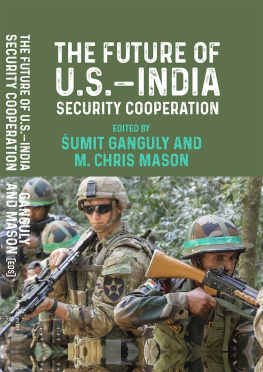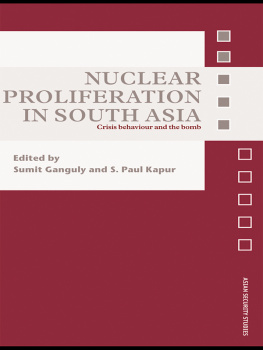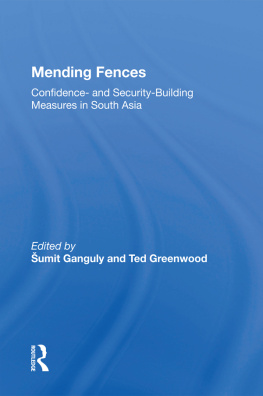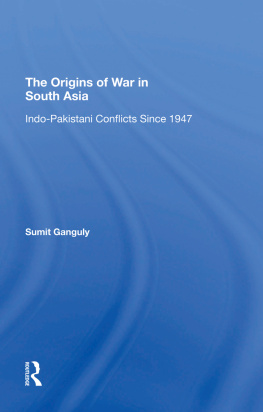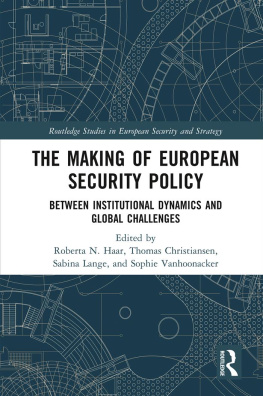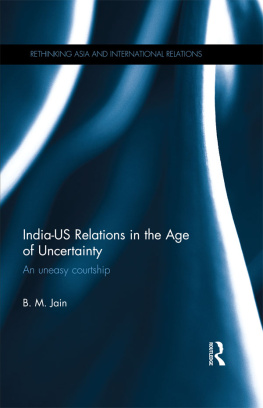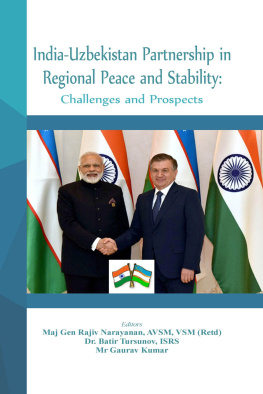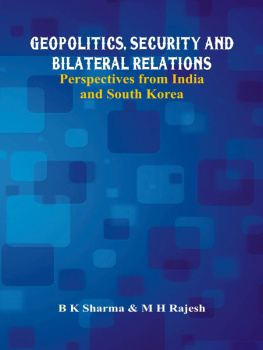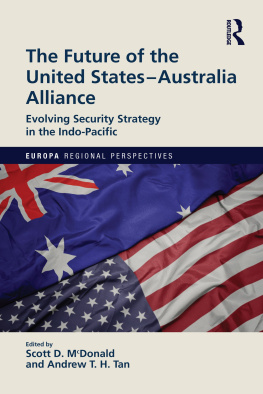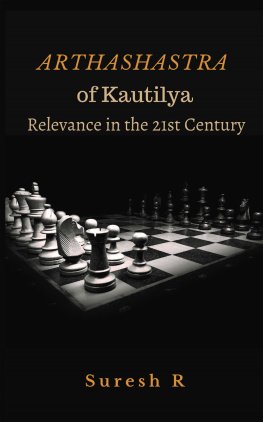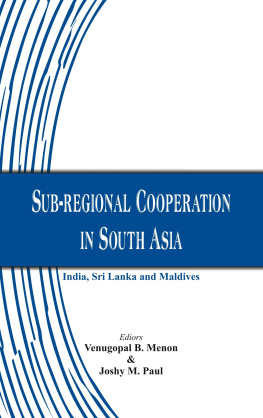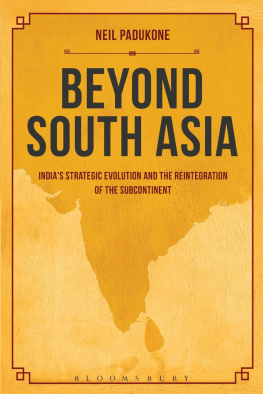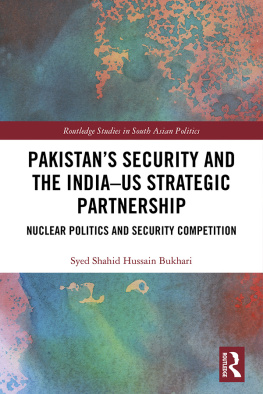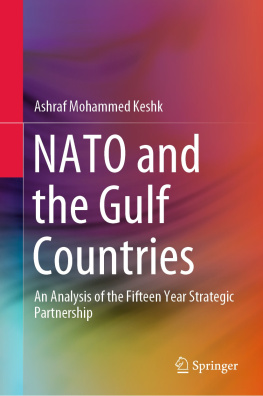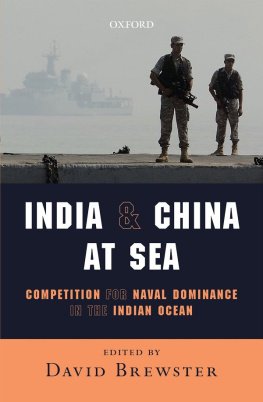The future of U.S.India security cooperation
The future of U.S.India security cooperation
Edited by
umit Ganguly and M. Chris Mason
MANCHESTER UNIVERSITY PRESS
Copyright Manchester University Press 2021
While copyright in the volume as a whole is vested in Manchester University Press, copyright in individual chapters belongs to their respective authors, and no chapter may be reproduced wholly or in part without the express permission in writing of both author and publisher.
Published by Manchester University Press
Altrincham Street, Manchester M1 7JA
www.manchesteruniversitypress.co.uk
British Library Cataloguing-in-Publication Data
A catalogue record for this book is available from the British Library
ISBN 978 1 5261 5514 6 hardback
ISBN 978 1 5261 5515 3 paperback
First published 2021
The publisher has no responsibility for the persistence or accuracy of URLs for any external or third-party internet websites referred to in this book, and does not guarantee that any content on such websites is, or will remain, accurate or appropriate.
Cover design: Abbey Akanbi, Manchester University Press
Typeset by
Servis Filmsetting Ltd, Stockport, Cheshire
umit Ganguly dedicates this book to his daughter, Tara, in the hope that her generation might see a better world.
Chris Mason dedicates this book with love to his daughter, Hannah. Its a big world out there Treasure, and full of adventures. My favorite one is being your father.
Contents
Figures and tables
Figures
Tables
Contributors
Tricia Bacon is an Associate Professor at American Universitys School of Public Affairs.
Saikat Datta is an award-winning India-based journalist and author specializing in security issues and a founding partner of DeepStrat Consulting LLP.
Carol V. Evans is Director, Strategic Studies Institute, U.S. Army War College. Her wide-ranging research areas include: geoeconomics, Indo-Pacific maritime security, and U.S./NATO critical infrastructure protection.
umit Ganguly is a Distinguished Professor of Political Science, holds the Tagore Chair in Indian Cultures and Civilizations at Indiana University, Bloomington and is a columnist for Foreign Policy.
Jamil N. Jaffer is the Founder and Executive Director of the National Security Institute at George Mason Universitys Antonin Scalia Law School and a Senior Vice President at IronNet Cybersecurity; among other things, he previously served as the former Chief Counsel and Senior Advisor to the U.S. Senate Foreign Relations Committee and as an Associate Counsel to President George W. Bush.
Manoj Joshi is a journalist and author. He is a Distinguished Fellow at the Observer Research Foundation, a think-tank based in New Delhi.
M. Chris Mason is a retired Foreign Service Officer and a Professor of National Security Affairs at the U.S. Army War College.
Bedavyasa Mohanty is a lawyer and technology policy professional whose research lies at the intersection of emerging technologies and national security.
Frank ODonnell is a Postdoctoral Scholar in the Rising Power Alliances Project in the Fletcher School of Law and Diplomacy at Tufts University, and a Nonresident Fellow in the South Asia Program at the Stimson Center.
Pramit Pal Chaudhuri is Foreign editor of the Hindustan Times, distinguished fellow Ananta Aspen Centre and member of the Indian National Security Advisory Board (201115).
Rajesh Rajagopalan is Professor of International Politics at Jawaharlal Nehru University, New Delhi.
Rajeswari Pillai Rajagopalan is a Distinguished Fellow and Head of the Nuclear and Space Policy Initiative at the Observer Research Foundation, New Delhi.
Abhijnan Rej is a New Delhi-based researcher, analyst, and consultant.
Victoria Samson is the Washington Office Director for the Secure World Foundation, a private organization that promotes a global, cooperative approach to ensure the long-term sustainability of space. She has over twenty years of experience in military space and security issues.
Abbreviations
| BECA | Basic Exchange and Cooperation Agreement |
| CCIT | Comprehensive Convention on International Terrorism |
| COMCASA | Communications Compatibility and Security Agreement |
| DRDO | Defence Research and Development Organisation (India) |
| DTTI | Defense Trade and Technology Initiative |
| FATF | Financial Action Task Force |
| FMS | foreign military sales |
| FTO | foreign terrorist organization |
| GSP | Generalized System of Preferences |
| IDEX | Innovation for Defence Excellence |
| IOR | Indian Ocean Region |
| ISI | Inter-Services Intelligence (Pakistan) |
| MDA | Maritime Domain Awareness |
| MTCR | Missile Technology Control Regime |
| NCTC | National Counterterrorism Center |
| NTM | national technical means |
| PLAN | Peoples Liberation Army Navy |
| PRC | Peoples Republic of China |
| SDGT | Specially Designated Global Terrorist |
| TNWs | tactical nuclear weapons |
Introduction: an unnatural partnership? The future of U.S.India strategic cooperation
umit Ganguly and M. Chris Mason
Flawed assumptions?
For many American observers assessing the political, military, and economic status quo in Southern Asia, for more than a decade India has stood out as a potential security partner. From a U.S. perspective, Indias strategic position bordering China and Pakistan and jutting out like a thumb into one of the most critical maritime shipping routes on earth is obvious. Its democratic values and its title as the worlds largest democracy, added to self-evidently shared concerns about Indias neighbor Pakistan, have seemed to many in the U.S. to make increased security cooperation a natural step for both countries. Americas great military power and strategic reach, the Washington calculus goes, combined with Indias geostrategic position and economic potential, appear to be the two sides of a solid strategic marriage of convenience. After all, both countries are largely dependent on maritime trade for economic growth, both share concerns about apparent Chinese intentions to dominate the Indian Ocean, and both are deeply troubled by an unstable state exporter of terrorism with nuclear weapons on Indias contentious western border.
Indeed, viewed from the U.S. cultural perspective of a country long accustomed to the security of vast oceans and benign neighbors India appears to be almost completely surrounded by potential enemies and thus in need of powerful friends. Chinas carefully planned and growing assertiveness in the region, in particular, suggests that New Delhi should welcome a strategic ally, or at least a partner, to counterbalance Chinas rising economic and military power and its seemingly boundless appetite for strategic resources. Pakistans unstable political foundations, its forward-deployed nuclear weapons, and its support for international terrorist organizations like Lashkar-e-Taiba make it, and other terrorist groups, a clear and present danger to both the U.S. and India. Indeed, for many American political and military leaders, this perception of a confluence of shared interests has become almost an article of faith. Why

